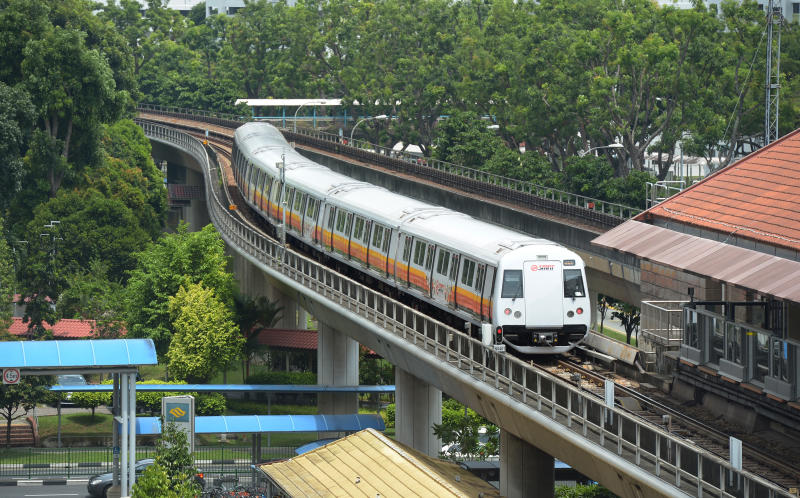SMRT says asbestos not used in its network
Sign up now: Get ST's newsletters delivered to your inbox

SMRT was responding to queries from The Straits Times about a statement it sent to one of several commuters who had complained about a burning smell on trains and station platforms.
PHOTO: ST FILE
SINGAPORE - Rail operator SMRT has come out to assure the public that its trains do not contain asbestos, a material that is highly hazardous to health and which is banned in Singapore.
The company was responding to queries from The Straits Times about a statement it sent on Thursday (July 12) to one of several commuters who had complained about a burning smell on trains and station platforms.
In the statement, SMRT said its new trains use "composite brake blocks made of fibre asbestos with metallic grains".
The explanation, shared on Facebook by commuter Alvin Lee, said the brakes give off "a strong smell" when heated. "This will gradually reduce as the brakes become seasoned over time," SMRT said, adding that the smell does not pose any health risk.
When contacted, the National Environment Agency said the importation of asbestos and products containing asbestos for use in Singapore has been prohibited since the late 1980s.
"The prohibition was extended to include asbestos (in the form of chrysotile) containing vehicle brakes or clutch lining installed in any vehicles," it added.
Asbestos fibre can be inhaled and carried into deep recesses of the lung, where it can cause fibrotic lung disease. This leads to irreversible scarring and breathing difficulty. It can also cause lung cancer.
Several metro operators around the world have removed or are removing asbestos-lined brakes from their trains. According to public awareness group Asbestos Global, Chinese trains imported to New Zealand and Australia were found to contain asbestos as recently as 2014.
A check with SBS Transit - the other rail operator in Singapore - revealed that none of its trains contain asbestos.
Dr Tan Shian Ming, a 39-year-old doctor who commutes by MRT, said: "It is not safe to be exposed to asbestos. I'm worried, and I hope that there will be some clarity from SMRT."
Dr Tan said he had also detected the strong burning smell, especially on train platforms on the North-South Line.
Another commuter, Ms Betty Tan, a 50-year-old housewife, said she detects the burning smell on both the North-South and East-West lines.
"I've been noticing it since last year," she said. "It smells quite toxic and makes me want to get out of the station immediately."
When told of SMRT's reply which was shared on Facebook, Mrs Tan said: "Oh, that's really terrible."
In a clarification sent on Thursday eight hours after ST asked about its asbestos statement, SMRT said it had all been a mistake.
Chief commuter engagement officer Elaine Koh said: "We assure commuters that asbestos is not used in any part of our MRT network.
"It was a human error caused by one of our customer relations staff putting his own words and sending the e-mail reply to a commuter too quickly. We are tightening the clearance process for all reply letters. We are sorry for the unnecessary alarm caused."
Ms Koh added that MRT trains come to a stop through friction braking by the application of brake shoes directly onto the wheels of the train. Heat is generated as a result and a strong smell associated with high temperature may be given off occasionally.
"We are working with the Land Transport Authority on reducing such occurrences on the network," she added.
ST had previously contacted SMRT about the burning smell but was told that its investigations had found nothing amiss.


